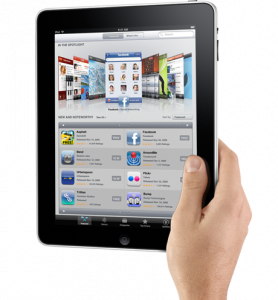I came across this article today on Forbes.com, and it brought up a point that I’ve been pondering for the past few weeks: is it better to get a data plan for the iPad from AT&T or a data device from Sprint or Verizon for close to the same price?
At first, this seems like a simple answer. The AT&T plan is $15.95 for 250mb, and $30.00 for “unlimited” usage, so go with that. After all, you don’t go past the unlimited mark with your iPhone, so the iPad shouldn’t be any different right?
Well sure, but it’s not that simple. See, both Verizon and Sprint offer mobile Wi-Fi hotspots for really low prices, then you can get a data plan for anywhere from $39 to $59 a month. Yes, that’s a substantial increase in cost, but it’s also not only for one device. You could use it for your iPhone, laptop, even your home computer if need be. It’s an all-in-one solution that doesn’t require a locked-in subscription for the single device.
I’ve been putting some feelers out there on this topic recently, and I hope to have some hard data to back up my thoughts soon. In the interim, let’s discuss the options.
Ultimately, the iPad and how it’s used for data is up to you and where you plan on using it. If your iPad stays at home 24/7, then chances are the Wi-Fi mode will be just fine. If you plan on taking it anywhere though, you’ll either need to be sure they have Wi-Fi, or get a 3G model. The only real advantage with the AT&T plan is that it gets onto the same bills as your iPhone so you can just put out one check. I guess that makes it easier.
The Verizon/Sprint option means that you’d have to carry a device with you at all times to run your mobile hotspot. Although that’s inconvenient, it’s not ridiculous to consider. Not only would you be able to use the hotspot, but so would any of your friends who needed to hop on as well. Plus Sprint has 4G service in some areas, making it an even faster option to consider. It doesn’t make sense to use this option if you just have an iPad, but chances are you also own an iPhone, and in moments where 3G coverage is crappy, you could log onto the Verizon/Sprint model and get going. Better yet, use a laptop.
For me, the main difference is in the cost. It’s $60 for the biggest plan that they both have, which is pretty pricey. then again, if you use it more than a few times a month, it’s going to pay for itself. The other issue is the contract, which is required on both other providers. The AT&T option is nice because you can opt out whenever.
Like I said, I’m hoping to have some better numbers soon to back this up. In the meantime, if you have any thoughts on the topic, drop them in the comments box.





4 thoughts on “The Data Plan Question”
I’m sorry but that article was a bunch of ramblings…please get your thoughts together
Stick with your i-Phone, and avoid adding more booty to the telecom treasure-chests. (Also, keep using your MacBook Pro instead of an ‘i-Pad’)
$60 a month every month means paying $720 a year to Verizon.
$30 a month on an as needed basis, while using WiFi wherever available – such as in your office or home or Starbucks, etc. means you may never need to pay AT&T or only the occasional $30 or even $15.
This is a no brainer. The IPad with 3G wins. AT&T’s $30 a month on an as needed basis is so much cheaper than the $720 a year paid to Verizon.
Something to consider alongside the “data anywhere you have signal” capability of the WiFI+3G iPad, is that the WiFi-only model does not have a GPS receiver built-in and triangulates with WiFi like an iPod Touch would.
Regardless of concerns over availability of an Internet connection, if you plan on using any app with iPad that relies on precision location, you’ll want the 3G version for the GPS and AGPS capabilities.